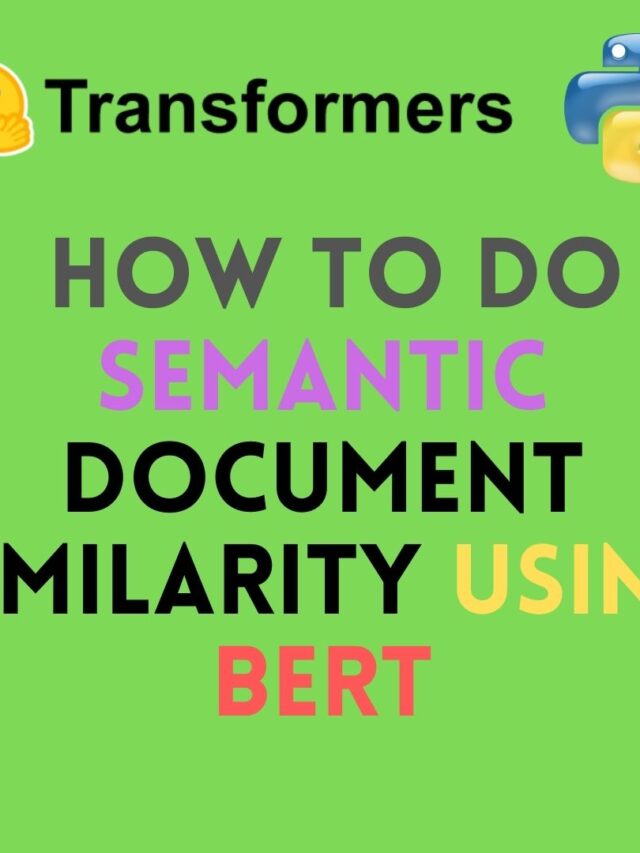How to do Question answering using Huggingface transformers and BERT? See how you can use the transformers pipeline for Question answering using BERT.
Transformers provide general-purpose architectures (BERT, GPT-2, RoBERTa, XLM, DistilBert, XLNet…) for Natural Language Understanding (NLU) and Natural Language Generation (NLG) with over 32+ pre-trained models in 100+ languages and deep interoperability between TensorFlow 2.0 and PyTorch.
Question-answering is the task of extracting answers from a tuple of a candidate paragraph and a question.
Two types: Closed domain and open domain.
Closed domain QA system extracts answer from a given paragraph or document.
Open-domain QA system extracts answer from a large corpus of documents like Wikipedia for a given question.
Huggingface transformer has a pipeline called question answering we will use it here.
Question answering pipeline uses a model finetuned on Squad task.
Let’s see it in action.
- Install Transformers library in colab.
!pip install transformers
or, install it locally,
pip install transformers
2. Import transformers pipeline,
from transformers import pipeline
3. Set the pipeline.
nlp_qa = pipeline('question-answering')
4. Pass the context and question to the pipeline.
nlp_qa(context='Google, LLC is an American multinational technology company that specializes in Internet-related services and products, which include online advertising technologies, a search engine, cloud computing, software, and hardware.Google corporate headquarters located at Mountain View, California, United States.',
question='Where is based Google ?')
Which shows the output,
{'answer': 'Mountain View, California,',
'end': 291,
'score': 0.4971035420894623,
'start': 265}
Now, let’s try a different model.
We will use a tiny transformer model called bert-tiny-finetuned-squadv2
Set the bert-tiny model in model and tokenizer as below,
# Alternative:# Alternative:
from transformers import *
tokenizer = AutoTokenizer.from_pretrained("mrm8488/bert-tiny-5-finetuned-squadv2")
model = AutoModelForQuestionAnswering.from_pretrained("mrm8488/bert-tiny-5-finetuned-squadv2")
bert_tiny_nlp_qa = pipeline('question-answering',
model = model,
tokenizer = tokenizer)
Pass the same question and context to the bert_tiny_nlp_qa pipeline.
bert_tiny_nlp_qa(context='Google, LLC is an American multinational technology company that specializes in Internet-related services and products, which include online advertising technologies, a search engine, cloud computing, software, and hardware.Google corporate headquarters located at Mountain View, California, United States.',
question='Where is based Google ?')
which shows following output,
{'answer': 'Mountain View, California, United States.',
'end': 305,
'score': 0.5947868227958679,
'start': 265}
As you can see both are giving same answer.
Performance comparison based on inference time:-
Now lets see the inference time for these two models pipeline on a CPU.
Inference time for default model QA pipeline,
%timeit nlp_qa(context='Google, LLC is an American multinational technology company that specializes in Internet-related services and products, which include online advertising technologies, a search engine, cloud computing, software, and hardware.Google corporate headquarters located at Mountain View, California, United States.', question='Where is based Google ?')
output:
1 loop, best of 3: 875 ms per loop
Inference time for bert-tiny model QA pipeline,
%timeit bert_tiny_nlp_qa(context='Google, LLC is an American multinational technology company that specializes in Internet-related services and products, which include online advertising technologies, a search engine, cloud computing, software, and hardware.Google corporate headquarters located at Mountain View, California, United States.', question='Where is based Google ?')
output:
1 loop, best of 3: 233 ms per loop
As, you can see bert-tiny is 3.75 times faster than the default pipeline.
Here is the Colab link.
Let me know in comments section, if you are facing any issues.
My other articles about BERT,
How to cluster text documents using BERT
How to do semantic document similarity using BERT
Zero-shot classification using Huggingface transformers
Summarize text document using transformers and BERT
Follow me on Twitter, Instagram, Pinterest and tumblr for new post notification.



5 replies on “Question answering using transformers and BERT”
[…] is a single pipeline for all kinds of NLP tasks like Question answering, sentiment classification, question generation, translation, paraphrasing, summarization, […]
[…] simplest way to use pretrained SOTA model for different types of NLP task like sentiment-analysis, question-answering, zero-shot classification, feature-extraction, NER etc. using two lines of […]
[…] Question answering using transformers and BERT […]
[…] Question answering using transformers and BERT. […]
[…] Question answering using transformers and BERT […]